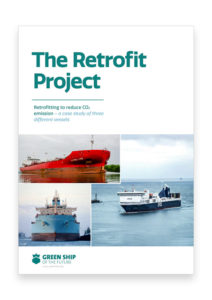New report shows large potential for energy optimization with a payback of less than 3 years
In a project, under Green Ship of the Future, 20 partner organizations have identified potential double-digited savings through retrofittable solutions with an ROI of less than 3 years.
In the Retrofit Series project, which began in 2019, Green Ship of the Future and 20 partners examine the potential for energy optimizing existing vessels, and thereby reducing their fuel consumption and CO2 emissions. The report shows potential achievable savings of up to 27% through technology that are available today and can be retrofitted with an ROI of less than 3 years. In addition, the report points to some general areas, which based on the case studies of three different vessels, show potential for large energy savings.
The project analyzes three different high-volume vessels – two MR tankers from Hafnia and Maersk Tankers, and a RO-PAX ferry from DFDS. By applying actual data from the vessels and their operational profile, the partners have analyzed the three cases for potential savings. The purpose of the report is to investigate what we can do with the large part of the global fleet that is not up for renewal anytime soon and therefore will continue to emit the same large amount of greenhouse gases as today, unless we equip them with new technology. The project is part of GSF’s mission to find a sustainable way to reduce emission from the maritime industry. While the end goal is a new fuel that does not affect the climate and environment to the extent it does today, and such a transition is underway, it will be decades before technology is scaled and we can transition the entire global fleet. Therefore, energy optimizations from an environmental and climate perspective will be essential in the coming years. While the GHG emissions will become neutral with the implementation of alternative fuels, the financial gain from energy optimizations will only increase, as all alternative energy sources are projected to be significantly more expensive than fossil counterparts. Therefore, investing in improving energy efficiency will not only make a good sense from a climate perspective, it can contribute to future competitive advantages.
“In DFDS we believe that the report and project results speak for themselves. Projects like this are welcome eyeopeners for potential retrofits that can lower our environmental impact and present a good business case. It is positive to see that despite a lot has been done, there are still large savings to be made. We believe we must continue to optimize our vessels to become even more sustainable, reduce operational costs and stay competitive, but also to ease the change to alternative energy sources. We hope that this project will bring concrete saving potentials and inspire others to optimize their vessels.”
- Rune Jørgensen Daae, Project Superintendent, DFDS
Partners in the project: Hafina, DFDS, Maersk Tankers, Alfa Laval, MAN Energy Solutions, Wartsila, C.C. Jensen, Dansk Energirådgivning, BOS Global, Norsepower, Kongsberg, MS Engineering, Bureau Veritas, DNV GL, Greensteam, Optimum Voyage, DESMI, Royston, DEIF, Clorius Controls and HEMPEL
More information: Frederik Schur Riis, Head of Green Ship of the Future. fs@greenship.org / +45 81774848
About Green Ship of the Future: Green Ship of the Future is an independent non-profit collaboration driven and financed by its members from across the maritime industry. Through collaboration, we work towards a sustainable emission free maritime industry. Together, we explore short- and long-term solutions and all the necessary stepping stones between today, 2030, 2050 and beyond. We believe that collaboration across the entire maritime ecosystem, and those connected to it, is necessary to reach solutions at the quality and pace which is needed. We wish to bring the right stakeholder together, we wish to inspire, and we wish to facilitate innovation through collaboration.

